|
|
Member
Posts: 213
Location: Forest Lake, MN | http://www.postcrescent.com/apps/pbcs.dll/article?AID=/20070513/APC...
WarrenMN |
|
| |
|

Member
Posts: 3899
| Just read this in the Milwaukee Journal, as well. This is not good news.
I hope everybody, including the pleasure boaters heed the advice of the DNR, and drain their bilges and livewells at the launch. But I am afraid it is only a matter of time before this affects other lakes. |
|
| |
|
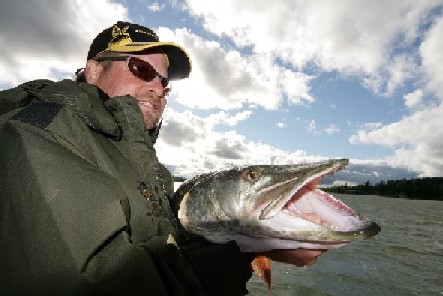
Member
Posts: 1406
| Here's a pretty good article,
http://blog.midwestlakes.org/06-11/viral-hemorrhagic-septicemia.htm...
Zach,
Can you compile a trawler news section here with as many articles as you can find on VHS! Would be nice to have a single location of info.
Good Luck
Tyee |
|
| |
|
Member
Posts: 213
Location: Forest Lake, MN | I think its going to have very bad impact regionally is why I posted at the three websites I frequent. Every one is going to be affected. This will likely spread across Wisconsin after their opener last weekend and I'm betting you'll see out breaks across the in land waters across the state radiating out from Winnebago.
I wouldn't be surprised now to see suggestion or even introduction of a ban on minnows or other water born baits as the infection can survive freezing.
WarrenMN
Edited by WarrenMN 5/13/2007 9:00 AM
|
|
| |
|
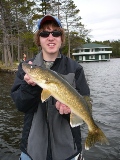
Member
Posts: 82
Location: Janesville | i hope that we can contain this to only a few lakes but if people dont listen and dont do what the dnr tells them to do then its going to spread like wildfire. lets hope we can contain this to only a few lakes. if this spreads throughout wisconsin then the fisherys are in BIG TROUBLE.
Edited by walleye slyr 5/13/2007 10:01 AM
|
|
| |
|
| This VHS will be in every lake before to long. Boaters have NO idea what it takes to clean out their wells and water left in the bottom of their hulls. I'm sure this was brought in by boaters early in the discovery of the virus. Sad but I fully expect the VHS virus in every major walleye fishing lake, within a 4 year stretch. |
|
| |
|
Member
Posts: 885
| Not to point any fingers at anyone in particular... but might it be a strong possibility that boaters returning from Lake Erie fishing may have brought the virus back and introduced it to Bago. It had to be transported from an infected source. Purple Skeeter
Edited by Purple Skeeter 5/13/2007 11:59 AM
|
|
| |
|
Member
Posts: 885
| Here's a pick from a fish reported to be caught on Poygan from Lake-link.com/Winnebago thread.
(596c85e0b3bd96af07a0db49b95a5375[1].jpg)
Attachments
----------------
 596c85e0b3bd96af07a0db49b95a5375[1].jpg (43KB - 91 downloads) 596c85e0b3bd96af07a0db49b95a5375[1].jpg (43KB - 91 downloads)
|
|
| |
|

Member
Posts: 2680
Location: Essexville, MI./Saginaw Bay. | Ocean going freighters brought it in in their ballast sea water, and then planted it by transferring/dumping their bilge water when in the Great Lakes. And (Joe Blow/weekend boater) is not going to rinse his bilge out with anticeptic after his long trip home with the kids. Unlike the other many invasive bullets we've dodged over the last 15 years, this one may have hit some vitals. It's time to voice our concerns in a loud, clear and united voice. Stop the ocean shipping, or find a safe answer to this water transfer problem.
Edited by walleye express 5/13/2007 12:21 PM
|
|
| |
|
| walleye express - 5/13/2007 12:02 PM
Ocean going freighters brought it in in their ballast sea water, and then planted it by transferring/dumping their bilge water when in the Great Lakes. And (Joe Blow/weekend boater) is not going to rinse his bilge out with anticeptic after his long trip home with the kids. Unlike the other many invasive bullets we've dodged over the last 15 years, this one may have hit some vitals. It's time to voice our concerns in a loud, clear and united voice. Stop the ocean shipping, or find a safe answer to this water transfer problem.
LMAO
You think that a billion dollar industry cares about our fishing waters? Or the Fed government that benifits from said industry? NO and NO they will never stop shipping it brings to many everyday needs to us and the tax and job base is tio large! |
|
| |
|
Member
Posts: 2567
Location: Manitowoc, WI | If they took the time to calculate how much it would cost them short term versus long term to stop bringing ships into the Great Lakes they would stop in a minute. But, given this world we live in with the need for instant gratification that will not happen.
Every invasive species that enters the Great Lakes does so with a price to be paid. Legislatures are actually starting to look on the side we're on in these matters. I copied and pasted an article on this website a 2-3 weeks ago talking about just this subject. I'll try to find it a bring it here.
As for VHS.....anyone who thought we could do anything to stop it is only fooling themselves. There are measures we can take to diminish it's effect, but there is no stopping this monster from entering every freshwater system in North America. It's just a matter of time.
The studies that are being done in the Eastern Great Lakes, where this predator has been for a few years now, will give us some answers as to how we should treat it and maybe lessen it's effect on our fisheries.
I'm of the opinion that this disease has been around a little longer than we we know.....similar to CWD in Wisconsin. And I also believe that just like CWD there are measures that can be taken to slow and lessen it's effect on a fisherie. Only time will tell. |
|
| |
|
Member
Posts: 2567
Location: Manitowoc, WI | Here is the article from April 22nd regarding the responses of different legislatures around the Great Lakes regarding shutting down incoming shipping from the Atlantic Ocean.
Attachments
----------------
 JS Online Ban ocean vessels in lakes Some are floating the idea.htm (65KB - 195 downloads) JS Online Ban ocean vessels in lakes Some are floating the idea.htm (65KB - 195 downloads)
|
|
| |
|

Member
Posts: 2680
Location: Essexville, MI./Saginaw Bay. | Gordy - 5/13/2007 6:10 PM
LMAO
You think that a billion dollar industry cares about our fishing waters? Or the Fed government that benifits from said industry? NO and NO they will never stop shipping it brings to many everyday needs to us and the tax and job base is tio large!
Glad you find it so funny Gordy. But for your info there is about 5 legislators in my state of Mich working on a such a bill right now. With many others from other states and Canada looking in that same direction. The difference in money made by these shippers and their customers versus the total moneys that will be lost if the fisheries collapse is very lopsided. The VHS is past worrying about, it's the next killer or evasive that I'm worried about. But you just stay setting on your hands bud, and let the people who care stick their neck out and take the heat that comes with that assignment. 
Edited by walleye express 5/13/2007 6:45 PM
|
|
| |
|
Member
Posts: 213
Location: Forest Lake, MN | While you argue about regulating shipping, I think your not focusing on the immediate actions that might get called for on the sport fishing industry, a total ban on all water related bait. There likely was a built in barrier between the big lakes and how they're fished and water flow that contained this till now. The single action of this spreading inland to where it can find new methods of transport in the minnow industry is not good. Right now this is contained in the water shed of eastern Wisconsin. In time I'm betting you'll see spot out breaks of fish kills spreading out from that chain of lakes and then it'll jump across to the Mississippi drainage as infected bait is carried to the next destination. It may seem unfair to point to minnows, but I believe this is the worst vehicle for spread of the disease. No we maybe can't stop it, but maybe we can slow it down. We're going to have to look at what it takes to do it and do it quick.
In case you haven't figured out the point I'm going after, slowing it down could mean the decimation of the bait shop industry. While some have suggested certified bait, a total bait movement ban would be more effectively enforced.
This problem is now two fold and should be taken as a last warning. While some are going to say going after the shipping industry is shutting the door after the horse is out, but who's to say the next invasive species that gets introduced might not make this look minor.
Some guick decision are going to have to be made and you better get ready to put up or shut up. There ain't no going back.
We need to have the eyes on the water to report fish kills in hours, not weeks and in a central forum.
WarrenMN
|
|
| |
|
| Really? Well when you get all the facts straight about the monies let me know. We are talking about millions of jobs in that industry (well paying jobs) Think about it, it's a whole lot more than the people working the ships themselfs!
Your States "elected" are gonna do or say what they think is best for them and their own. However getting things through a Federal government is MUCH tougher than your little States Reps would lead you and others to believe.
So yes the FUNNY part is how they have "you" fooled into thinking they really care about you. In fact they "grand stand" more common than a comedian, thats how they get elected and their name in the highlights. The big problem is it's their 15 min. of fame and then the subject seems to fade.
So yes Dan, your comments are funny, or just the fact that you believe they truely care or could do anything about it.
All commercial fishing as well as shipping and cruise ships would have to just stop----- NOT gonna happen Dan, and I'm sure you are smart enough to know that.
The only true way to stop this spread is STOP all boating worldwide, or atleast no boat or ship may enter any body of water other than one designated body of water. So if you fish Erie thats it, you can't go elsewhere. Or Sag than thats it, never put it on the trailer and hit an inland lake or river!
|
|
| |
|
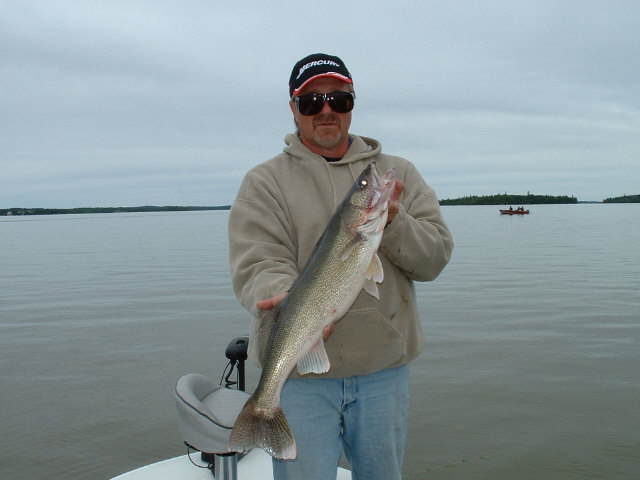
Location: Rhinelander | Gentlemen,
Arguing over what the Feds will or won't do or about anything else on this issue will not get us anywhere. Sportsmen have to present a united front. Use that energy to contact the officials that WILL be trying to get something done, and make as much noise as is possible to help them get something done. I think Gordy meant ironic more than amusing. |
|
| |
|

Member
Posts: 2680
Location: Essexville, MI./Saginaw Bay. | So yes Dan, your comments are funny, or just the fact that you believe they truely care or could do anything about it.
Gordy.
What they really believe matters little to me. But I'll fight the hardest about what I believe and care about. I'll write, threaten, voice my opinion, spread the word to concerned others and not vote for any rep that ignores what harms our states mostly valuable resources. Once they know this is not just a limited opinion by a few crazy's but the majority of this states voting sportsman, what I believe will conveniently become what they believe. If all this fails I will at least feel good about what I tried to do. |
|
| |
|
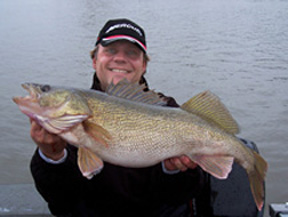
Member
Posts: 2393
Location: Waukesha Wisconsin | Please read and sign petition ......
http://www.glu.org/english/invasive_species/saltfreelakes/index.htm
Now, I'm starting to wonder if the shad die off that we had this spring really was normal and not the first sign.
One thing that I would like to stress....... Let's all work together rather than point fingers or get into arguments. Let's use that energy in a productive way. This will be a very emotional situation that will take a long time to fix by many individuals. We must all work together and continue to get the facts right. Let's try to stay away from he said/ she said or I heard from my uncle Louie. We will need factual information.
It just so happens that I wrote some info about preventing the spread in my June article for Midwest Outdoors. Here's the info..............
Do your part to avoid spreading viral fish disease and other invasive species.
A viral fish disease responsible for huge fish kills on several eastern Great Lakes underscores the need for all Wisconsin anglers to take steps to avoid accidentally spreading aquatic invasive species to more lakes and rivers. This is a deadly fish virus that kills fish outright, instead of crowding them out as many other invasive pests do. It could have potentially devastating effects if it spreads to our inland waters.
Viral hemorrhagic septicemia (VHS) virus is a serious pathogen of fresh and saltwater fish that is an emerging disease in the Great Lakes region of the United States and Canada. The VHS virus affects fish of all sizes and ages. It does not pose any threat to human health. VHS causes hemorrhaging of skin, muscle, and internal organs, and death follows. Some fish infected with VHS will develop antibodies to the virus and will survive. However, after a period of time the fish may start shedding virus again and spread the disease to other fish.
Based on the diagnosis of VHS virus in chinook, walleye, and lake whitefish from Lake Huron in 2006, fisheries biologists believe the virus is probably already in Lake Michigan, and ballast discharged from ships may have moved the virus to port cities on Lake Superior.
The clinical signs of VHS may include hemorrhaging (bleeding), unusual behavior, anemia, bulging eyes, bloated abdomens, and the rapid onset of death; however, these symptoms could apply to many different fish diseases. VHS must be confirmed by lab tests. Additionally, some infected fish may not show any signs and transporting these fish to new locations could spread the disease to new waters.
VHS is not a health threat for people who eat or handle fish infected with the virus. But the virus can infect more than 25 game fish, panfish and bait fish species. It’s suspected to be present in Lake Michigan and possibly in Lake Superior and in the Mississippi River. Wisconsin recently enacted emergency rules for boaters, anglers and people who harvest wild bait to prevent its spread to inland waters.
The viral fish disease is not the only threat that boaters need to worry about. Water-milfoil, zebra mussels, gobies, spiny waterfleas and other invasive species are found in some Wisconsin lakes and can displace native plants, interfere with swimming, boating and fishing. Most of our waters are still free of invasive species but we all need to work to keep it that way.
Anglers, boaters and other water users can help prevent the spread of invasive species and VHS by taking a few simple steps:
• Never move live fish or fish eggs to other waters.
• Buy bait minnows only from Wisconsin bait dealers because bait from other states may not have been tested for VHS.
• Inspect boat, trailer and equipment and remove visible aquatic plants, animals, and mud before leaving the lake launch.
• Drain water from boat, motor, bilge, live wells, and bait containers before leaving a lake. This step is recommended for boaters on all waters and is require under the emergency rules for boaters on the Great Lakes and the Mississippi River and their tributaries up to the first dam.
• Dispose of leftover bait in the trash, not in the water. Do not take live fish or live fish eggs away from the boat landing.
• Rinse boat and recreational equipment with hot water OR dry for at least five days.
• Report large numbers of dead fish or fish with bloody spots to your local DNR fish biologist or conservation warden.
• Leeches, worms, and insects are OK. The use of leaches, worms, and insects for bait is not affected by the new rules. In these rules the term bait means all or part of any frog, crayfish, fish, or fish egg.
• Be careful with dead bait. If you want to use dead bait (all or part of any fish, fish egg, crayfish, or frog), the bait must be a) used on Lake Michigan (including Green Bay and tributaries up to the first dam), b) used on the lake or stream where it was captured, or c) preserved by means other than refrigeration or freezing.
• Kill your fish after fishing the Great Lakes or Mississippi River. You may not transport live fish or fish eggs (including both bait and game fish) away from waters of the Great Lakes or Mississippi River drainages (including tributaries up to the first dam).
|
|
| |
|
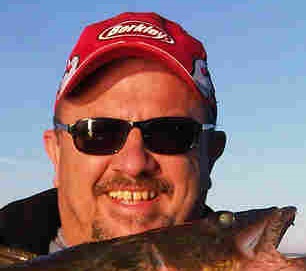
Member
Posts: 1195
Location: Orland Park, IL | Siince Lake michigan is relatively close to Winnebago. Any transfer risks there? |
|
| |
|

Member
Posts: 2393
Location: Waukesha Wisconsin | yes,
Transfer to and from Lake Michigan. As far as we know, this could have come from Lake Michigan. We know that VHS is in Erie and Superior. How could it NOT be in MIchigan? |
|
| |
|
| How many of you guyes went to Lake Erie this year or are planning too?? And how many fished winnebago without disenfecting your live wells? I think VHS has been in our system for awhile now and the DNR may or may not know it. To educate yourselfs on the disease here are a couple good links...shutting the BDM locks will probably have little effect if any...
http://www.lsc.usgs.gov/fhb/leaflets/83.asp
http://www.michigan.gov/documents/dnr/Viral-Hemorrhagic-Septicemia-... |
|
| |
|

Member
Posts: 2680
Location: Essexville, MI./Saginaw Bay. | Your absolutely right Dennis. I apologize to all for what seemed to be a harsh reply to Gordy. But the laughing thing got to me. And my pasion for subjects such as these can make my written word come off a bit strained at times.
Few people know the futility of dealing with burocratic egg heads when it comes to the hunting and fishing sports more then I do. I've seen well to often the failed results of their planning and thinking when they make their decisions based on the book or perceved conclusions, rather then the facts that I see daily on the rivers and waters I guide and charter on. Have had my neck stuck out many times for my voiced and written disapprovals. And have had my azz chewed out by the best political and agency professional egg heads in public forums and meetings. Doesn't change what I've observed first hand on the water. Because a person does not have a degree in the specific science, he's assumed to know nothing of the facts involved? BS.
Edited by walleye express 5/14/2007 8:57 AM
|
|
| |
|
Member
Posts: 617
Location: Oshkosh, Wisconsin | Sorry, but I have to agree with Gordy on this one. It would take a MASSIVE amount of money to come up with a viable alternative to status quo on shipping through the Great Lakes. Suppose we choose to close the locks and not allow ANY vessel up the St. Lawrence Seaway - then what? Develop a fleet of Great Lakes only ships so what we can re-load every ship prior to it reaching it final destination? Pay for trucking from the east coast? The financial impact of this would be devastating to the mid-west. I agree that it is important to work together, but there is almost NO chance of closing the seaway. Come up with a viable plan before you ask for my support.
A call for tougher regulations to combat invasives would be a worth-while cause and educating everyone of the actions to take to fight their spread (as Sunshine posted) certainly is a great idea. Perhaps we can even use this terrible bit of news to help combat the opening of the Fox River locks. But don't ask me to waste my time calling for the closure of the seaway - that simple won't happen.
I hope I'm wrong on this.
Edited by Brad B 5/14/2007 9:09 AM
|
|
| |
|

Member
Posts: 2680
Location: Essexville, MI./Saginaw Bay. | Come up with a viable plan before you ask for my support.
Brad.
You and I have butted heads before on other issues. I don't want or seek a rematch now. Especially with something this important to everyone. I think we both got over that episode quit well. But let me pose this (make believe) question to you.
You just got word from your doctor that you have what may well be terminal cancer. Their not sure yet on how they want to proceed to treat it and possibly save your life. You can however (if you choose) start the chemo theropy that will stall the cancers progression until they decide what course to choose. So, should you wait for a viable plan before they get your support?
Edited by walleye express 5/14/2007 9:15 AM
|
|
| |
|

Member
Posts: 2393
Location: Waukesha Wisconsin | Brad,
I tried finding the facts for you but unfortunately the Milwaukee Journal now charges for back issues. They did a great series on exotic species and the shipping industry. I'll keep looking so that we all can quote facts. Here is one fact for ya' that I did find.
Oceangoing traffic on the Great lakes accounts for only about 7% of all Great Lakes shipping. The rest is what you already mentioned. They are a fleet of Great Lakes only ships.
I also know what I read.
In the absence of federal regulations, states have started to impose strict standards on ballast. On Jan. 1, Michigan started requiring permits for ships to release ballast. To get a permit, the ship must show it has technology onboard to treat ballast to kill invasive species. Last year, California imposed rules that ballast have no detectable level of organisms by 2020.
"The states are understandably impatient that we don't have federal regulations, but the shipping industry can't deal with different standards in every state," Theis says.
The Coast Guard has authority to regulate ballast under the National Invasive Species Act of 1996. It hopes to release an environmental analysis this summer. Proposed regulations could arrive in 2008.
"It's a … complex issue," says Bivan Patnaik, regulatory coordinator for environmental standards at the Coast Guard.
Congress has considered several proposals for standards over the last few years, but the bills have died because of disagreements over details, such as whether federal law should overrule state laws.
Cargo firms won't buy treatment systems, which cost $500,000 to $1 million per ship, until they know the regulations, says Joel Mandelman, vice president of Nutech 03 Inc., an Arlington, Va., company that sells a system to treat ballast.
'A Catch-22'
Regulators won't set standards until they know what technology works. And venture capitalists won't invest in developing a technology without knowing the regulation and marketplace.
"It's crazy. This is a Catch-22 that's been going on for a decade," Mandelman says.
In the late 1980s and early 1990s, the shipping industry began trying to reduce the release of invasive species. The industry encouraged ships to certify they had "no ballast on board." Those with ballast were expected to exchange the water in deep ocean, where high salt content would kill most invasive species.
The strategy hasn't worked. "We haven't seen a reduction in invasive species since these practices went into effect," says University of Michigan scientist Thomas Johengen.
Johengen's research found that ships can't dump all their ballast. A layer of murky water and sediment remains in the cavelike structure of a ship's hull. Even ships labeled as having "no ballast on board" are carrying invasive species.
When a ship unloads foreign cargo in the USA, the vessel takes on ballast. The Great Lakes water mixes with the foreign residue to become an aquarium for invasive species. Later, when the ship takes on U.S. cargo before it leaves, the freighter dumps perhaps 60,000 tons of ballast mixture into the Great Lakes.
Johengen says ballast must be treated inside the ship to kill invasive species.
It's not clear how best to do that. Several approaches — using chemical, heat, ozone or ultra-violet rays — are being explored. Research has been slow because it's unclear what the regulations will require.
|
|
| |
|
Member
Posts: 617
Location: Oshkosh, Wisconsin | My personal health will not cost the jobs of countless people living in the mid-west if we fail to address issues like this properly. What if the fish in 'Bago and the Great Lakes are able to develop a tolerance to VHS and it ends up having a negiligible impact on our fisheries? Should we risk the jobs of all of the people tied to the cheap transporation the GL's provide on an emotional whim?
I understand that this is an emotional issue and that some people such as yourself have more to lose than others, but we MUST make sure we approach this issue rationally or we could make things even worse.
Perhaps there is a fiscal rationale for closing the seaway to saltwater traffic. Like any decision, if we do our homework, present a logical case and do so with a level head, we stand a much better chance of accomplishing our goals than if we make unsupported emotional pleas.
BTW, this isn't an attack on you or anyone else here Dan. I want more than anything to make sure the right thing is done. That's why I want to make sure we are making decisions for the right reasons.
|
|
| |
|
| Bad Analogy. That doesn't quit work in this case Capt Dan.
A closer analogy that shows Brad point would be if you have been diagnosed with terminal cancer, but instead of uniting your family and friends together to help you though the Chemo treatment that has a small chance of working, you spend all of your time and energy trying to get the FDA to approve some treatment that you heard about from some voodoo doctor in Maylasia so that you can have said treatment in the U.S. and paid for by insurance. Instead of joining together and working towards something attainable you are barking up the wrong FED tree.
When Mad Cow disease was the buzz in the news were people joining together to try and shut down the highways so that infected cows couldn't get transported?
I completely agree this is something that needs a LOT of attention. But spending that attention trying to obtain the unattainable it a waste of that effort.
I believe that was Brad's and Gordy's point. Not that they want to ignore the problem, but that if they/we are going to join a fight, let's make it a winnable one. |
|
| |
|

Location: Rhinelander | Treating ballast water, limiting discharge, and more... The waters of the Great Lakes belong to us all in the US and Canada, and the shipping companies have a responsibility to take care not to harm them. That responsibility hasn't been taken too seriously in the past, and may never be, but trying to get something done as an individual or group is a heck of alot better than sitting one one's hands.
The only way improvements are going to happen is interaction with the Feds, and our state folks raising enough cain to get attention directed at this issue. |
|
| |
|
Member
Posts: 617
Location: Oshkosh, Wisconsin | The last thing I have been doing is sitting on my hands. Too hard to type that way.
When we can't even get simple rules like treating ballast water passed, I think suggesting closure of the entire seaway is a bit foolhardy. All I ask is that everyone take a deep breath and act in a manner that will further our cause. Emotional pleas for help look great on the news, but this issue need more than that. Its the science, dollars, and cents that need to drive this, not another "think about the children" emotional outcry.
Its easy to see how a guide's business may suffer from the effect of invasives. If we can broaden the scope of this to show how entire communities AND business/manufacturing facilities will be hurt, it will be much easier to make real changes. Until then, its just not going to happen.
Oh, and let's not for get this is more than a Great Lakes issue. The Mississippi represents the same threat.
Edited by Brad B 5/14/2007 11:07 AM
|
|
| |
|

Member
Posts: 2680
Location: Essexville, MI./Saginaw Bay. | If this was the very first thing brought in by these ships over the many years they have been traveling Great Lakes waters, I'd say trying to halt all shipping would be a bit hasty and dramatic. But being able to rattle off at least 15 invasive's even I know of, and with one article saying a new one is introduced on the average of every 28 days, those facts and the failed shipping safeguards up until now alarm me greatly. Our fish may well develop an immunity to this new threat and God make it so. But even I can roll a 7 given enough failed/unfettered tosses of the dice.
I guess My part of what I can physically do is basically over. I've written all my state reps and our Governor. Made crystal clear my feelings on the matter. I also signed the petition. I'll make the time (if it happens) to attend any meeting on the subject and listen with an open mind about any suggested solutions by either party. I may be emotionally involved in this subject but have always been level headed about working solutions. I'm not against Big Business (I'm a GM retiree remember) or want to see any jobs associated with shipping lost in ours or other states. Hell, I'm one of the few plane citizens physically attending meetings and verbally defending Dow Corning on the Tittabawassee River clean-up project. Not for their poor standards and safeguards from what they and many others manufacturers did during the 1970's, but for taking responsibility now, keeping their business thriving and employing US workers in a hostile (revenge ridden) environment, while spending BIG bucks changing things for the better now. In fear of my emotional ratings on this VHS subject spoiling an honest debate, I'll make this my last post on the subject. And for the book, I found nobodies answer to my posts offensive. I hope mine were not taken the wrong way either.
Edited by walleye express 5/14/2007 11:13 AM
|
|
| |
|
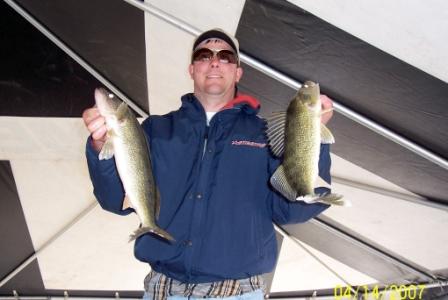
Member
Posts: 1656
| Stopping "Saltys" from traveling the Great Lakes seems like a monumental task in the minds of most. Let's take a look at this from an even larger scale.
The Great Lakes is just a micro scale problem of what the real big problem is. Ballast water discharge. In about 6th grade I learned that the Earth's surface is about 2/3rds water. The Great Lakes is a very very small percentage in comparable size. It sure makes me wonder how screwed the oceans are going to get before we react to that problem. By then it could be too late. Many strange dieseases have been carried by boat through out modern man kind's travels.
Think outside the box.....because I don't have the answer based on what I've been told. In the big picture, stopping "saltys" from traveling the Great lakes should seem like a "small" step. |
|
| |
|

Member
Posts: 2393
Location: Waukesha Wisconsin | As mentioned before. This problem is not new. What is new is finding VHS in an inland lake. We have had these problems for a very long time but it appears that nothing gets done at the federal level to correct the introduction of invasive species. When will we as a society get to a point that enough is enough? There are more than 160 nonindigenous, or invasive, species that have become established in and around the Great Lakes. Why do we continue to let this happen?
I believe that we are all a part of the problem. We do not or have not taken the actions needed to voice our concerns and make our appointed officials stand up and take notice. Let’s be honest with ourselves, how many of us have done anything up to this point? Sounds to me that Captain Dan is one of the few. Unfortunately the legislature does not listen to the few. It takes a very large collective voice to create change.
It’s hard for me to believe that with all of our technological knowledge we can not come up with a long term solution to invasive species and specifically the VHS virus. My brief research show that there are agencies trying to come up with solutions for all invasive species. What I have not seen, is a public outcry that may be needed to wake up everyone.
Walleyes For Tomorrow has done an absolutely wonderful job of educating and helping the walleye and sauger populations of Winnebago. Is it possible that they (we) can expound on their success and work on this issue? What good does it do to create more spawning reefs and help with stocking programs when the fish are dying? I know that I am jumping the gun here prior to scientific evidence that shows that the walleye population will be severely hurt. But it has happened in other places where VHS has been found AND VHS is front page news now. We all need to keep this in the forefront because it becomes non-news and people forget about it.
I have started doing some reading to better educate myself to the problem and possible solutions. Here are some websites that I have found so far.
http://www.great-lakes.net/envt/flora-fauna/invasive/invasive.html
http://www.uscg.mil/hq/g-m/mso/ans.htm
http://www.great-lakes.net/teach/pollution/ans/ans_1.html
http://www.nmc.edu/glwsi/
http://www.glerl.noaa.gov/res/Programs/nsmain.html
http://www.glc.org/ans/pdf/briefpapercomplete.pdf
|
|
| |
|
Member
Posts: 540
Location: Milw, WI | Well think of this.
The Mississippi river is connected direct to lake michigan.
Via the Illinois river.
So any one who fished there early this year and did not bleach all your livewells, and bilge.
You brought it home to waters you next launched your boat in.
Any one tryed to fish Lake Delavan , the zebra mussels in there cover the standing weeds.
I hate to stir the pot or sound so negative , but last year I bleached out our livewell while my partner slept.
So it got done before putting the boat in to devils lake.
He thought putting the bleach water in the system would screw it up and make it unsafe for holding the fish later.
I explained that the bleach goes inert after so much exposure to air.
But he did not want it done.
So I got it done.
The water is never completly out of our boats, that is why those hoses,speed o's., and pumps freeze and burst in the winter time.
We must disinfect after each use.
Or they must do before you are allowed out the the parking lot at the lakes,or before you are allowed to put in.
More jobs more money but it must be done.
It should be the law for us boaters to disinfect the boats after leaving any body of water.
Drain systems at the lake, then pour in the mixture.
5 gallon bucket of water (can be done with lake water from your drain) , 1/2 gallon of bleach.
What is the cost like $0.60 each time.
In a few hours the water would be safe to drain out, done.
Edited by Richfish 5/14/2007 12:17 PM
|
|
| |
|
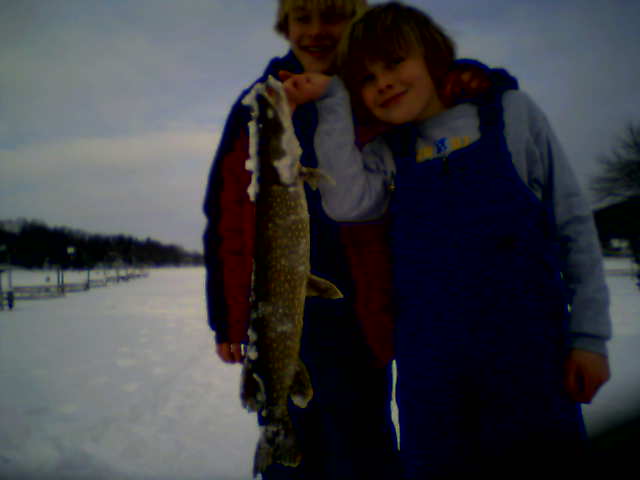
Member
Posts: 141
Location: Oshkosh, WI | The do's/don't list posted earlier in this thread seems to make sense. I found this additional recommendation on a Canadian Fact Sheet:
"Never return fish with obvious signs of disease to the water. If you are concerned that a fish is showing obvious signs of disease, contact your local fisheries authority."
Is the idea of cleaning up the dead and dying fish just crazy because there would be no way to stay ahead of the sheer numbers? It seems like anything that could be done to reduce the viral load in the water would reduce the number of fish killed in the first spike of the epidemic - giving more fish a chance to build resistance so the population would not have to be decimated before beginning to rebuild. I am sure this would have no effect in the great lakes, but what about in a shallow inland lake system?
If there is a fisheries biologist in the house, I would be interested your thoughts.
|
|
| |
|

Member
Posts: 2393
Location: Waukesha Wisconsin | More interesting reading............
Of the roughly 500 salties entering the Great Lakes in a year, only about 10 percent come under federal ballast discharge regulations. The rest are exempt because they are cargo laden and report no ballast onboard (NOBOB). NOBOB vessels are required to submit ballast water reporting forms and encouraged to flush their ballast tanks mid-ocean (swish and spit) but they may still carry residual water or sediments into the Great Lakes.
Motivated by the number of new invasive species reports from the Great Lakes, Michigan lawmakers insist all ships with ballast tanks that have floated on salt water and then expect to use ports in the ‘wolverine state’ need scrutiny and a $150 annual permit; NOBOB vessels included. Additionally, by approving Bill 332, they indicated dissatisfaction with mid-ocean ballast flushing and its ability to purge potential AIS. The new Michigan law requires that ballast water be kept onboard, or be treated by a state-approved method before discharge.
“Michigan is taking a necessary and important step towards protecting the Great Lakes,” said Robert McCann, Press Secretary for the Michigan Department of Environmental Quality. “We’re proud to be moving forward but, to really succeed in stopping invasive species from entering the Great Lakes through ballast water, every Great Lakes state and every Great Lakes province needs to participate.”
“Similar ballast laws are being considered in Minnesota, Wisconsin, and Indiana,” said Bergeron. “What happens with the Michigan law will likely impact what those states attempt.” Among Michigan ports, Detroit and Menominee could be most affected by the new law since they handle the majority of saltwater ships in the state. However, the number of ships is very small since most of the salties on the Great Lakes are bound for Canadian ports and terminals in other states.
To date, no shipping companies have applied for a Ballast Water Control General Permit from Michigan — although there is still time, since the ocean-going shipping season doesn’t begin until late March.
The whole article and web page.................
http://www.seagrant.umn.edu/newsletter/2007/02/law_center_identifie...
|
|
| |
|
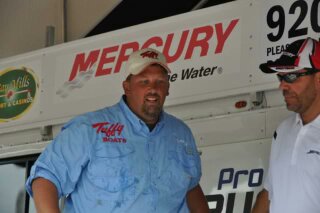
Member
Posts: 67
| Here is a question posed to me today at one of the local bait shops today maybe someone has an answer or recomendation concerning this. The DNR has issued a release that states if you catch a fish with VHS or showing signs of infection you are not to return it back to the water. Which is fine and I agree with that but that leads to the question of if we do that are they willing to allow those fish to not be counted as our daily bag limit.
I think it is our resposibility as sportsman to do the right thing but how many guys will go out there and say the first five walleyes they pull are infected actually put them in their boat? Interesting question I thought, would hope that they would look at that and take that into consideration if they would pull you over and check you catch.
I know a lot of you here guide and alot more of us here fish tournaments what is your take on this and how it could affect not only the daily guy out there catching fish to eat but those who depend on those fish for their living. Interesting thought....
|
|
| |
|

Member
Posts: 1406
| June is Invasive Species Awareness Month
During June, which is designated as Invasive Species Awareness Month in Wisconsin, numerous field trips, workshops, presentations and work parties are being held throughout the state to teach citizens about invasive species and what they can do to stop the spread.
People can find more about invasive species and Invasive Species Awareness Month through the Invasive Species Council’s Web site at http://invasivespecies.wi.gov/ (exit DNR) or on the DNR invasive species Web pages.
Good Luck
Tyee |
|
| |
|
Member
Posts: 885
| Although DNR officials are trying to determine a cause for the local VHS discovery, Arrowood said he knows of dozens of fishermen, including some who fish on Lake Puckaway, who have taken their boats to fish in Lake Erie, a walleye-fishing hotspot where VHS was first reported in 2005.
The DNR is recommending, among other things, that boaters rinse their boats with hot water or let them dry out five days in the sun before moving to new waters. This quote from the WI DNR shows that even they suspect that the virus was transported by fisherman who had visited Lake Erie this spring and brought back the infected water containing the virus. Time to enact new rules to protect our waters. Purple Skeeter link below http://www.postcrescent.com/apps/pbcs.dll/article?AID=/20070514/APC0101/70514190/1979&GID=R3rHHu5tDeYDqnrO74X5PGm6/0FcFCefSjTbpWwrRrs%3D
Edited by Purple Skeeter 5/14/2007 9:18 PM
|
|
| |
|

Member
Posts: 1406
|
http://dnr.wi.gov/org/nrboard/agenda/2007/070401-VHS.pdf
A good read, I hope someone is rewriting section 3 to include the Winnebago system NOW.
Good Luck
Tyee |
|
| |
|

Member
Posts: 1406
| PS There are new rules that I know many don't follow, Bilge, livewell and trailer needs to be free of all aquatic plants and water as the virus can survive for up to 14 days in water. There is a hefty fine, and of recent it IS being highly enforced at landings around the state especially those close to this system. Wardens are out in full force at many landings giving out tickets.
Personaly, I find it very difficult to remove vegetation from my rig when pulling out of most of the landings on the Winnebago system. I have a roller trailer so it isn't too hard but it IS impossible to remove all. I can only imagine how hard it is for the bunk guys.
What can we do to free these landings of all the weeds that are present in June and July. Where can we get funding to do this as well who can we get to do this.
I know the law has been in place for sometime now, but it is virtually impossible to accomplish it effectively on this shallow body of water...SOMETHING NEEDS TO BE DONE TO GET THESE LANDINGS CLEAN ENOUGH TO PREVENT THIS.
(Maybe a small step but needs to be done.)
Good luck
Tyee |
|
| |
|

Member
Posts: 1406
| Walleyes for Tomorrow is expected to be one of several groups at Saturdays event in Appleton protesting the future opening of the Fox River lock system. EVERYONE NEEDS TO GO!!!!!!!!!
Lets act as one group no matter who you blame, Opening the Locks is not a good thing.
http://www.friendsofthefox.org/
Where: Appleton Lock #2
CBC Parking Lot, Olde Oneida Street, Adjacent to Lock #2
Appleton, WI
When: Saturday May 19th , 2007
1 P.M to 4:00 P.M.
Lets see some ideas for protest signs, I'll make up a few!
Good Luck Tyee
|
|
| |
|

Member
Posts: 2393
Location: Waukesha Wisconsin | Tyee,
I'll assume that others like myself who would love tobe there will be prefishing for the MWS in Menoninee. Keep us posted on how it went.
From Today's Milwaukee Journal...............
http://www.jsonline.com/story/index.aspx?id=605216 |
|
| |
|
| Would this show up on all species of fish? the reason i ask is that i just caught a northern on the Big Eupleine Resivior and it had marking on both sides just like the ones on the walleye shown in this article. it had marking on both sides in the same locations. |
|
| |
|

Member
Posts: 2393
Location: Waukesha Wisconsin | Yes, it is possible.
See chart 1 of this report.
PS... this is the best resource that I have found so far:
http://www.aphis.usda.gov/vs/ceah/cei/taf/emergingdiseasenotice_fil... |
|
| |
|
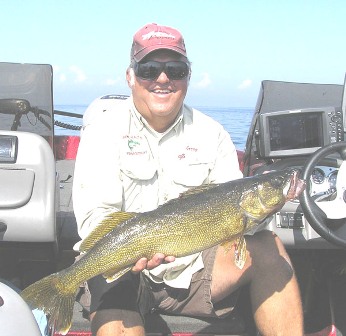
Member
Posts: 340
Location: McFarland, WI | I too am concerned about boat transfer of this virus but the fish eating birds will also transfer this virus when they carry dead fish back to nesting sites. This will be short distance transfer in most cases but it can lead to gradual spread throughout the fresh water lakes. Efforts to disinfect boats will work better to curtail spread of other invasive species but with VHS we may not be able to prevent the natural dissemination of the virus. Therefore if the virus crops up in a local lake don't be to fast in indicting a fisherman, especially if you see cormorants, eagles, pelicans, and herons in the area. |
|
| |
|

Member
Posts: 2393
Location: Waukesha Wisconsin | Great insight Larry!
I have a question for ya’. You are the closest person I know who is an expert on animal science.
Some of the readings that I have encountered suggest that the VHS virus will now be with us forever. They also suggest that given time, the fish may/will develop an immune system for the disease. If this is true are we doing more harm than good in the long run by removing any diseased fish? Are we prolonging this process?
I’ve never been a person that condones taking a wait and see approach. But if these ‘experts” are correct aren’t they suggesting that once a body of water is infected the best we can do is nothing? Let mother nature try to correct our mistakes? The only other plausible remedy that I have read is total eradication of all infected fish.
On another note: Here is a follow-up to your comment.
Fish-eating birds, such as the gray heron, can be mechanical vectors of VHS virus, but passage through the gastrointestinal tract of birds appears to inactivate the virus. The virus does not appear to be transmitted by parasitic vectors or to be capable of replication in insects. In the hatchery environment, mechanical transfer of VHS virus on the surface of animate or inanimate objects presents a substantial hazard.
|
|
| |
|
Member
Posts: 591
Location: in the boat off the east shore somewhere | i live between lake winnibaggo and lake michigan . there are hundreads of seagulls that fly between these waters every day . depending on wind conditions on the big lake ... this may have been transfered by boats but odds are pretty good that the transmittle can be done by mother nature . i keep my boat clean i check for weeds and zebras i make sure my wells are empty .. i put my boat in lake michigan twice last year.. i didnt run my motor dry ,, maybe i did it. lets try to make sure our boats are clean when we put in on our smaller lakes but this may not be the cause of transfer . if you have a seagull on your small inland lake or pond .. or a goose.. that may be the cause .. maybe its in the ground water. we know most of our lakes are connected in one way shape or form ... but pointing fingers , all you want guys its too late.. one thing is for sure .. its not the only exotic we will be exposed too. the only way to stop it is to not allow ships from salt water enter into our fresh water cannals .. transfer cargo to fresh water ships on a dock when it enters the country or shut down the shipping... not too many choices to stop future exotics. |
|
| |
|
| With the fish struggling to cope with VHS the DNR needs to step up and help out the system by closing the season on Winnebago until after the spawn and imposing slot and lower limits. Unfortunately we all need to forget about the past the times have changed for good.
|
|
| |
|

Member
Posts: 2393
Location: Waukesha Wisconsin | Waldo,
How do you know that will work? How do you know that it won't do more harm than good? Maybe, just maybe having too many fish in the system will cause the spread to get worst not better. For all you and I know, the answer may be just the opposite of what you suggest. Take all limits off and let people harvest the fish before they all die. Of course this answer may be just as silly as yours. Who knows? Not many people down this road before. |
|
| |
|

Member
Posts: 67
| With this virus being in the water, and the fact that it stays on your boat, bunks, trailers ect for up to a week or more. What about nets. When we are cleaning our boats, trailer and such do not forget to disenfect your net as well. Just one small thing that I think most people would over look. I know it is going to be hard to get everyspot on your boat, and trailer but I do think we need to get in the practice of doing what we can to limit this virus.
It will be a shame to think of the impact on the system as the DNR has worked hard over the past years to make the Winnebago system one of the best fisheries in the nation for Walleyes, Smallies, and yes even Muskies if you know where to go. Just hope all that hard work does not go to waste. |
|
| |
|

Member
Posts: 340
Location: McFarland, WI | Sunshine:
I'm not an expert on the VHS virus but we encounter similar viruses in other species. Upon initial exposure the most susceptible members of the population are infected and suffer the gravest consequences. This may be stressed members of the population and the source of stress may be age, environmental, etc or it might be genetically less resistant members. Survival of the fittest. The virus becomes endemic in the population because some infected members become chronic carriers and shedders. If the population is stressed we see secondary outbreaks. Control often entails removing stress factors one of which might be overcrowding. This becomes self limiting. It might end up that this virus will reduce the carrying capacity of a body of water especially in times of oxygen and heat stress. A strain of the virus is already endemic in the pacific northwest and it causes problems in pen raised(crowded) fish.
The birds are not carriers but mechanical vectors. They transport dead fish and have direct contact with the fish.
My question is: Will the stress of catch and release make these fish more susceptible to infection? Would we be better off to keep fish and reduce the stressed population plus reduce the total population to a less crowdwd level. The fish biologists need to answer the question of carrying capacities in the presense of this virus.
The state Aquaculture veterinarian is trying to organize a meeting to update us on this virus. As I get more information I'll pass it along. again I am not an expert and my information is general virology that may not strictly apply to this virus but it is my best educated guess.
Excuse any spelling errors as I am trying to get this done and get out of the office.
Larry
Edited by Larrys 5/15/2007 6:22 PM
|
|
| |
|
| Read this leaflet...talks about vhs above 15 degrees celsius...(59 degrees F).....this is NOT an immediate death sentence for all walleyes in winnie...
Article states "Deaths from VHS rarely occur at temperatures above 15°C."
In a hatchery situation...
Although VHS rarely occurs above 15°C, disease control by temperature manipulation has not been described. Selective breeding to increase host resistance to VHS has not been successful.
http://www.lsc.usgs.gov/fhb/leaflets/83.asp#clinical |
|
| |
|
Member
Posts: 213
Location: Forest Lake, MN | I find it interesting that since I started this post, maybe I've missed some thing but not one person has mentioned salmonid aquaculture, where this disease was first recognized and serious questions have raised about transportation of fish long before this variant of VHS was ever found. How many salmon/trout farms are there around the great lakes, and I'd start with around where that Muskie came from back in 2003.
" In addition, cage culture of salmonids occurs on the Ontario side of the Great Lakes , though not on the U.S. sides." from
Viral Hemorrhagic
Septicemia in the
Great Lakes
July 2006
Emerging Disease Notice
Actually, I thought it would be some thing I was reading about several years ago, Hematopoietic Necrosis that was going to jump species first.
I'm 100% against untreated ballast dumping, but to make informed decisions be sure to look under all the rocks.
I'm going to say some thing very unpopular here. Start thinking no live wells in your boats, no minnows or water related bait. The only water will be the ice melting in your live well or cooler. If you don't like this idea, go back to Table 1 on the link http://www.aphis.usda.gov/vs/ceah/cei/taf/emergingdiseasenotice_fil...
and check out of the two far right columns. It wasn't species specific but I took notice of the 20 to 80 percent die off in one of the other reports.
And why is it some one always wants to blame the birds. I think what they were saying, go put a stick in the water and take off for some other lake, you got the same odds of passing it as the bird. Is more likely you getting your pant leg wet loading your boat and heading to a new lake will pass it. If you leg is still damp when you get to the next landing, depending on temp, your likely more a risk than a bird.
WarrenMN
When some one says, its too late to close the door, be sure it isn't the barn on fire.
Edited by WarrenMN 5/18/2007 12:50 PM
|
|
| |
|

Member
Posts: 378
Location: Omro,Wi. | There are many questions we have now, and I was just thinking while reading the posts, that if my livewells are full of water from Bago and I go to Butte des Morts or Poygan, I'm spreading the VHS bye recirculating water, using the same baits, poles, line almost everything including the net and carpet, can get it transferred. My livewells don't drain 100% unless my boat is on a angle, or the bilge for that fact. If I put it on the trailer at the launch and pull out part way to drain the boat, how long before someone gets mad waiting for me? If I pull the weeds off what do I do with them? Throw them on the ground? Back in the water? so the next guy can pull them off his boat? Even if they made a ramp with a garbage can and a water hose at every launch site, how many people would wait in line to use it? I think it's here to stay and I hope the fish do become imune to it in time, but the vast devistation in the beginning will make us sick to our stomachs, to say the least. We need to know what to do with infected fish, as far as our daily bag limit, and what if we find or catch a Sauger or Sturgeon all bloody, can we bring it back to shore? So many questions and hardly no answers from the DNR. I think they should get going and get the answers ASAP cause the fishing gettin hot and people are on the water more everyday. But the rich people can drive their boats from Little Lake Butte des Morts to the Wolf river if they want, good for them. Sorry if I sound like I have had enough of the DNR and Polititions catering to the wealthy, but I have. |
|
| |
|

Member
Posts: 1406
| Will the rest of the tourneys be catch and Kill this year?....Sounds like per the rules they must be now. Also all bait must be disposed of before leaving the landing as well. I would suspect that if C&R is going away we might see some bag limits reduced after our first major kill next spring. I believe the DNR has the authority to make these kinds of changes based on emergency situations. Can anyone verify that for me?
Good Luck
Tyee |
|
| |
|
Member
Posts: 213
Location: Forest Lake, MN | I was just thinking, Conesus Lake, NY is what you might say is a half a cycle ahead of Winnebago. It'd really help to know what's going on out there. This might be a good microcosm for what your going to be facing. Also be nice if there was a fish survey before VHS and as time goes by.
WarrenMN
Edited by WarrenMN 5/18/2007 11:19 PM
|
|
| |
|
| I wonder since I heard fish are more susceptible at getting VHS at certain water temps will the shallowness of Bago hurt or help that theory. I know the great lakes are deep and cold. |
|
| |
 VHS found in Winnebago
VHS found in Winnebago VHS found in Winnebago
VHS found in Winnebago